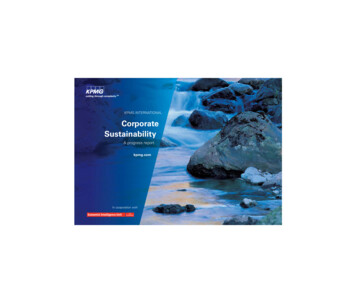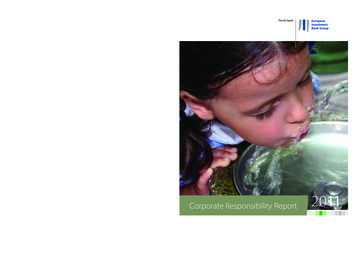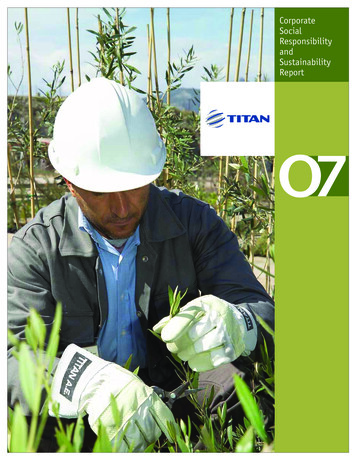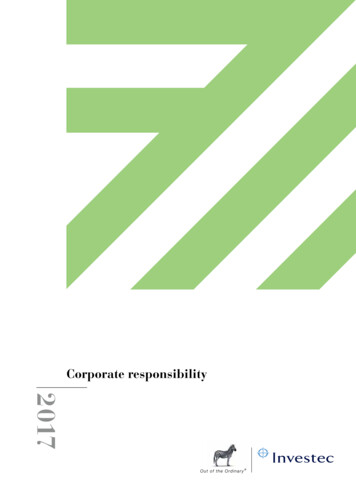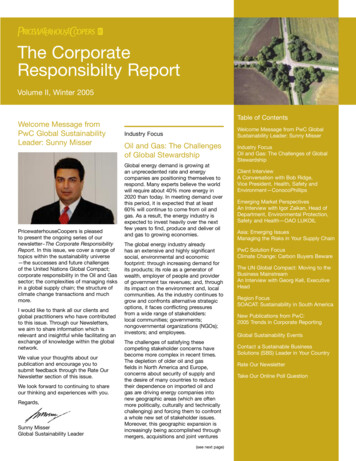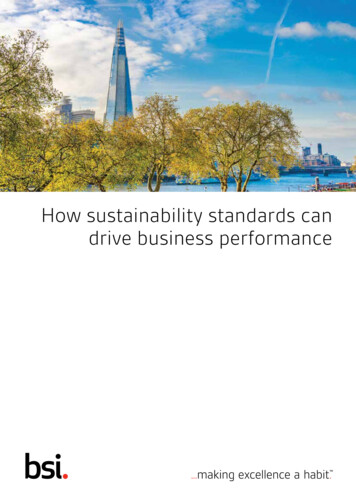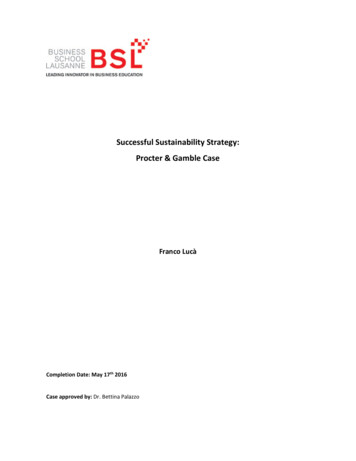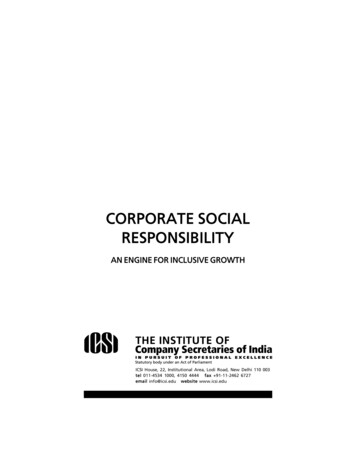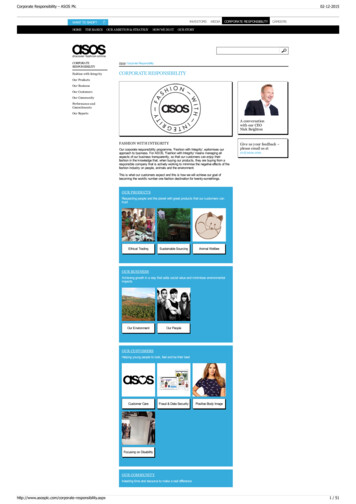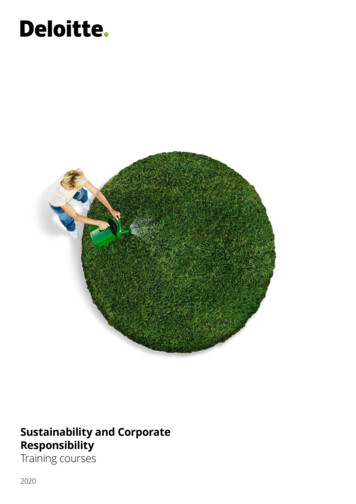
Transcription
Sustainability and CorporateResponsibilityTraining courses2020
Sustainability and Corporate Social Responsibility TrainingGreater demands for corporateaccountability, transparency,sustainable consumption, and ethicalpractices mean organisations needto be up to date when it comes tobest practices in corporate socialresponsibility and sustainability.03
Sustainability and Corporate Social Responsibility TrainingSustainability trainingat DeloitteWhether you are developing your skills or consolidatingthem, Deloitte offers a range of expert-led, interactivesustainability and CSR courses, including GRI-certifiedtraining, human rights in the supply chain, and climaterisk and disclosure (TCFD).Designed to cater to individual and business needs,those who can benefit from our best practice coursesrange from directors, CEOs, legal counsel, companysecretaries and general managers, to those responsiblefor sustainability and corporate responsibility,procurement, community relations, strategy, humanresources, and marketing and corporate affairs.Our courses are delivered by experts in their field andenable you to quickly upskill yourself or your team. Allcourses can be adapted to be delivered in-house, with aminimum attendance of six people.To book a course please go to our website.04
Sustainability and Corporate Social Responsibility TrainingClimate-related riskmanagement anddisclosure (TCFD)Societal expectations for climate change risk responsesand disclosures have been shifting rapidly, driven bystrong coordinated advocacy by investors, regulators,governments and markets. Best practice is crystallisingin the form of the recommendations from the Taskforceon Climate-related Financial Disclosures (TCFD). Issuesof concern and disclosure requirements can also begleaned from CDP and DJSI questionnaires.A range of challenges neverthelessconfronts practitioners: Building the business case for climaterelated risk and opportunity assessments Identifying the internal network andrelated data, management and reportingcapabilities that should be leveraged Understanding the complex web ofclimate-related risks and opportunitiesand how these interact with yourbusiness model Developing disclosures to meet TCFDrequirementsWho is the course for? Risk managers tasked with incorporatingclimate issues into enterprise riskframeworks Strategy managers wanting to considerplausible climate futures in strategydevelopment Sustainability managers facilitating anorganisation’s adoption of the TCFDrecommendations or tasked withresponding to questionnaires fromindices and analysts05Learning outcomes:After the course, participants will be ableto: Explain the requirements of the TCFDand their relevance to the organisation Construct a business case for action onaddressing the recommendations of theTCFD Identify and reference key sources ofphysical and transitional risk data Articulate how climate change interactswith your business model, and where andhow the company might be vulnerable torisks or presented with opportunities Pinpoint the top three candidate risksand opportunities that flow from climatechange Identify the functions and stakeholderswithin and outside the organisation thatwill be relevant to the actions movingforward on managing climate issues Develop a plan for disclosure accordingto the TCFD requirementsHalf daycourse
Sustainability and Corporate Social Responsibility TrainingThe road to an expertsustainability report –GRI-certified trainingTwo daycourseUnderstand how to prepare and co-ordinate an expertsustainability report using the world’s first globalsustainability reporting standards, the Global ReportingInitiative (GRI) Standards.Completing this GRI-certified trainingcourse will support you in yoursustainability disclosures whether you areproducing your first sustainability report,or wanting to ensure your practice has keptpace with evolving expectations.What you will learn:Sustainability reporting can be a keysource of competitive advantage, engagingstakeholders and driving performancethrough accounting for your organisation’seconomic, social, and environmentalimpacts. Identifying your most material issues forreportingAs stakeholders demand greatertransparency and relevance fromorganisational reports, the GRI Standardsramp up the focus on materiality –reporting what’s most relevant to yourorganisation and for stakeholders.The skills you will develop:This two-day course will provide you withthe skills and tools to navigate the reportingprocess, identify key stakeholders,distinguish your organisation’s materialissues and become your organisation’ssustainability reporting guru. Recognise the internal procedures andmechanisms you will need The business case and value ofsustainability reporting How to use the GRI Standards to improveyour disclosures Steps to produce a best practicesustainability report Plan a clear and structured sustainabilityreporting process from the beginning Identify key stakeholders and distinguishyour organisation’s material issues Evaluate the quality of sustainabilityreports using your newly acquiredknowledgeParticipants who successfully complete thistwo-day course will receive a GRI certificateof completion.06
Sustainability and Corporate Social Responsibility TrainingHuman rights in the supplychain – responding to Australia’smodern slavery legislationCan your company answer the following question?Were there human rights violations in your supply chain inthe last 12 months?The Australian Modern Slavery Act is now inforce, and with it comes expectations fromgovernments, investors, and customersthat companies will know the answer to thisquestion and be able to demonstrate howthey are responding to it.The Act applies to entities operating inAustralia with more than AUD 100 millionannual revenue and requires them toproduce an annual public statementdescribing what they are doing to addressmodern slavery risks. Statements areexpected to be produced within six monthsof an organisation’s reporting year andto be signed off by its principal governingbody.To help you prepare for compliance, thiscourse covers international standardsand frameworks such as the UN GuidingPrinciples on Business and HumanRights, how to conduct a human rightsrisk assessment of your operations andsupply chain, how to develop a roadmapfor addressing human rights in the supplychain, and how to respond to the Act’sreporting requirements.Who is the course for? Senior managers needing to understandhow best to comply with the act Risk managers tasked with incorporatingmodern slavery risks into enterprise riskframeworks Those developing their organisation’shuman rights policy and governancestructure. Sustainability or procurement managerstasked with writing their organisation’smodern slavery statementLearning outcomesAfter the course, participants will be ableto: Explain the requirements of Australia’sModern Slavery Act and how it pertainsto their organisation Map their organisation’s supply chain Develop their organisation’s ‘roadmap’ tocomply with the legislation Oversee human rights risk assessment intheir business Have confidence in preparing theirorganisation’s modern slavery statement.07Half daycourse
Sustainability and Corporate Social Responsibility TrainingCorporate SocialResponsibility 101 – Afresh look at CSRHalf daycourseCSR practice – understanding, measuring and reportingon an organisation’s true impacts on society and theenvironment – has undergone a remarkable evolution inrecent years.Today, it is an important measure ofbusiness performance and success– driving competitive advantage andinvestor sentiment, contributing to therecruitment and retainment of employeesand customers, and building strong brandvalue.This revamped half-day short course willintroduce you to the tenets of CSR, howit is practiced in Australia and aroundthe globe, and how it reflects the social,political, economic and environmentalissues of the day.Using case studies, you will uncover howCSR is put into practice along with thechallenges of implementation. Buildingon this, you will learn about the role ofstakeholders and gain an understandingof CSR’s relationship to risk, reputation,governance, and innovation.Participants will leave the course with: A solid foundation in the context anddevelopment of CSR Insight into the different approaches toCSR around the world An understanding of the emerging globalarchitecture for CSR Knowledge about stakeholders, issuesand risks The ability to communicate the benefitsand business case for CSR.Whether you are beginning a new role inCSR, or after a refreshing outlook on thetopic, this short course is for you.08
Sustainability and Corporate Social Responsibility TrainingStakeholder engagement– strengthening your sociallicence to operateBuilding mutually beneficial stakeholder relationshipshas never been more important for success in business.Effective stakeholder engagement can forestall crises,build social licence to operate and lead to innovativesolutions to shared problems.In this one-day short course, you willunderstand the megatrends requiringorganisations to continually invest inproductive, collaborative stakeholderrelationships. You will learn how to identify,map and prioritise stakeholders and theissues that bring stakeholders to yourdoorstep, and acquire practical analytictools to use in your own organisation.This course is ideal for organisationsoperating in challenging and complexstakeholder environments – and availableas either a public access short course oran in-house workshop. It is suitable forgroups or individuals, including seniormanagers whose work requires effectivemanagement of external stakeholders,sustainability, and community relationsteams.What you will learn? The stakeholder principle, and how it isdefined in popular CSR frameworks suchas GRI, AA1000 and ISO26000 How stakeholder relationships buildtrust, create social capital and improvesocial performance09 Best practices in stakeholderengagement with reference to real worldcase studies The organisational aspects ofimplementing a successful stakeholderengagement strategy How to prepare an effective stakeholderengagement plan.Skills you will develop will include: Identifying, classifying and prioritisingstakeholders, and analysing issues Mapping links between issues andstakeholders and using these mapsto generate strategies for effectiveengagement Developing an effective approach toplanning stakeholder engagement.One daycourse
Sustainability and Corporate Social Responsibility TrainingImportant informationFor up to date information about dates and locations of our courses, please see nsibility-training.htmlDespite our best efforts, dates of courses can shift. To keep up to date with the latest datesand locations we recommend you join our sustainability events mailing list.Contact usFor more information about any of our courses, please contactJackie AllenderSenior Manager, Risk Advisoryjallender@deloitte.com.au 61 3 9671 6501Paul DobsonPartner, Risk Advisorypadobson@deloitte.com.au 61 2 9322 542210
This document and the information contained in it is confidential and should not be used or disclosed in anyway without our prior consent.Deloitte refers to one or more of Deloitte Touche Tohmatsu Limited (“DTTL”), its global network of memberfirms, and their related entities. DTTL (also referred to as “Deloitte Global”) and each of its member firmsand their affiliated entities are legally separate and independent entities. DTTL does not provide services toclients. Please see www.deloitte.com/about to learn more.Deloitte is a leading global provider of audit and assurance, consulting, financial advisory, risk advisory, taxand related services. Our network of member firms in more than 150 countries and territories serves fourout of five Fortune Global 500 companies. Learn how Deloitte’s approximately 286,000 people make animpact that matters at www.deloitte.com.Deloitte Asia PacificDeloitte Asia Pacific Limited is a company limited by guarantee and a member firm of DTTL. Members ofDeloitte Asia Pacific Limited and their related entities provide services in Australia, Brunei Darussalam,Cambodia, East Timor, Federated States of Micronesia, Guam, Indonesia, Japan, Laos, Malaysia, Mongolia,Myanmar, New Zealand, Palau, Papua New Guinea, Singapore, Thailand, The Marshall Islands, The NorthernMariana Islands, The People’s Republic of China (incl. Hong Kong SAR and Macau SAR), The Philippines andVietnam, in each of which operations are conducted by separate and independent legal entities.Deloitte AustraliaIn Australia, the Deloitte Network member is the Australian partnership of Deloitte Touche Tohmatsu. Asone of Australia’s leading professional services firms. Deloitte Touche Tohmatsu and its affiliates provideaudit, tax, consulting, and financial advisory services through approximately 8000 people across the country.Focused on the creation of value and growth, and known as an employer of choice for innovative humanresources programs, we are dedicated to helping our clients and our people excel. For more information,please visit our web site at https://www2.deloitte.com/au/en.html.Liability limited by a scheme approved under Professional Standards Legislation.Member of Deloitte Asia Pacific Limited and the Deloitte Network. 2020 Deloitte Risk Advisory. Deloitte Touche Tohmatsu
for sustainability and corporate responsibility, procurement, community relations, strategy, human resources, and marketing and corporate affairs. Our courses are delivered by experts in their field and enable you to quickly upskill yourself or your team. All courses can be adapted to be del
